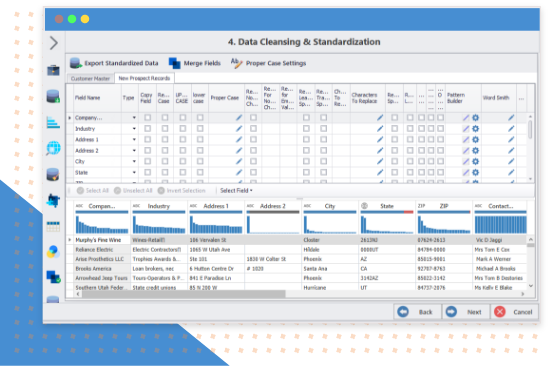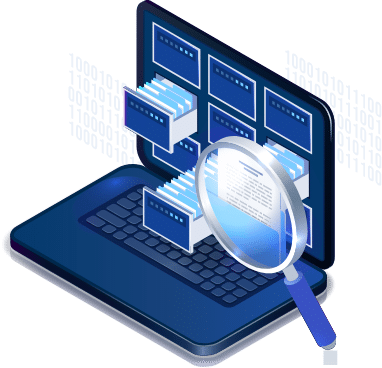Data Ladder - Trifacta Alternative
This comparison sheet will compare Data Ladder’s DataMatch Enterprise with Trifacta’s Data Wrangler, a data cleaning and preparation solution.
- There is a frantic search for a data quality solution that can help businesses clean, sort, fix and unify their data. Moreover, the data quality solution should be flexible enough to allow the organization to maintain data quality in real-time while ensuring that security and data compliance standards are met. Data Ladder’s DataMatch Enterprise (DME) solution is a one-stop data quality solution that offers data profiling, data matching, data cleansing and much more.

Data Ladder Vs. Trifacta: Data Wrangler Enterprise

Trifacta provides data transformation services through its Data Wrangler tool. Users can convert raw data into a clean and usable form, converting data types, removing duplicate data, and enriching the data.
Data Ladder also provides data transformation services but it is not limited to just data cleansing. It offers data matching as an essential solution that allows users to match data across disparate data sources to get a complete view of their information. Additionally, it also offers a full-fledged address verification feature that is not available in Trifacta.

Data Integration
As businesses continue to use new CRMs and apps, they will want a quality solution that connects directly to the data source.
Data Ladder also provides data transformation services but it is not limited to just data cleansing. It offers data matching as an essential solution that allows users to match data across disparate data sources to get a complete view of their information. Additionally, it also offers a full-fledged address verification feature that is not available in Trifacta.
DataMatch Enterprise (DME) allows for easy integration with 150+ apps. This means businesses can directly clean, edit, match and fix data quality issues right within their data source without having to worry about importing or moving data. You can integrate:
- Files (Excel, Delimited Text File, Excel (97-2003), Fixed Width Text File)
- Databases (Direct integration with SQL Server, Oracle, Teradata, and many more)
- CRM (Integration with Salesforce, MS Dynamics CRM, Sugar CRM)
- Social (Integration with Facebook and Twitter)
- Services (XML and JSON)
- Email apps
- Other (ODBC-supported databases)


Trifacta supports most major Big Data and relational data sources but lacks connectivity with most CRMs, social media platforms, and enterprise applications.
Data Profiling
The primary goal of data profiling is to provide an overview of the problems within the data set. For example, incomplete addresses, invalid phone numbers, ZIP codes with letters etc are data quality issues that are highlighted during the profiling process.
- Identify which of your lists have irregularities or oddities.
- Gives a confidence score to each of your fields.
- Statistics on your dataset’s size, median, mean, average, standard deviation, etc.
- Tailor-made expressions that let you sort data over 19 different fields.
- Create custom expressions using a Pattern Builder option.
- View all your profile history changes.
- Visual data exploration to help you see your audience clusters.
- Identify nicknames from a pre-defined dictionary of nickname.


- Statistics such as the dataset’s size, distribution, quality, distinct values, median, mean, quartiles, average, and standard deviation, to name a few.
- Percentage of valid, mismatched, and empty values in your results file.
- Number of columns in your results file.
- Number of rows in your results file.
- The ID of your result file.
- The data source that was used to generate your results file.
Data Cleansing
Data fields with inaccurate spellings, case settings, and other structural problems need to be cleansed by fixing the inconsistencies. Ideally, this needs to be done right within the data source so that errors are nipped in the bud.
DME has a full-fledged data cleansing and standardization system that allows users to:
- Change cases and ensure that each field follows a defined standardization.
- Find and replace different characters.
- Choose whether you want to preserve abbreviations.
- Set your own exceptions.
- Choose delimiter that separates your fields such as tabs, comma, semicolons etc.
- Remove spaces, numbers, letters, non-printable characters, zeros and zeroes with letters.
DME also has a unique WordSmith tool that allows you to standardize names and addresses. This is especially useful if you want to ensure that a certain word is automatically replaced or removed in a list.


For data cleansing, Trifacta follows a six-step process that sums up all the features discussed above.
1. Discovering: Gives an overview of the data.
2. Structuring: Formats the data to be used in traditional applications.
3. Cleaning: Removes data that may distort analysis and standardizes it into a single format.
4. Enriching: augment the data with internal or third-party data to enhance the data for better analysis.
5. Validating: brings data quality and inconsistency issues to the surface so the appropriate transformations can be applied.
Trifacta, being a data preparation solution focuses on multiple aspects of data cleansing. It allows users to standardize data and remove or correct inaccurate records.
Data fields with inaccurate spellings, case settings, and other structural problems need to be cleansed by fixing the inconsistencies. Ideally, this needs to be done right within the data source so that errors are nipped in the bud.
Data Matching
Data matching is an important function of almost every data cleansing and preparation solution. That said, none of the popular solutions including Trifacta, SAS or IBM offer a full-fledged data matching function. Data Ladder is the only data-matching solution that has the highest matching accuracy rate at 96%.
Most data matching solutions rely on fuzzy logic to match data, but DME has a proprietary algorithm that outbeats every other solution in the market. A study conducted by Curtin University proved DME’s accuracy at 96%, while IBM and SAS were at 84% and 83% respectively.
Additionally, Data Ladder offers the ability to perform cross-jurisdictional matching where users can match multiple data sources instead of lists within a specific data source. Cross-jurisdictional matching is an important feature that government and public sector organizations need to create research reports, receive grants and optimize government processes.
DataMatch Enterprise’s data matching allows you to:

Define how you want to match data sources using four options – all, none, between and within. All looks for matches between each data source as well as matches within each data source. If you don’t want to do all, you can just choose between or within to look for duplicates between data sources or within data sources.
Get matches based on exact, phonetic, numeric and fuzzy matching techniques.
View match results and create a Master Record that you can use as a surviving record.
Save and export your results for later review.
Use a merge and survivorship option to overwrite data based on your criteria.Choose the fields you want to map by the fields of your data list.
Run multiple matching sessions simultaneously.
DME is specifically dedicated to providing a flexible data matching solution that gives the user the ability to do much more than just basic matching.
Features in DME that are Not Available in Trifacta
Being a data transformation solution, Trifacta is a great software for companies that want an easy-to use, easy-to-access, web-based solution. However, Trifacta lacks some core features offered by Data Ladder.
Let’s take a look at features that are not available in Trifacta:
On-Premises Solution
DataMatch Enterprise is primarily an on-premises solution. It can be deployed on a company’s own server and can be used behind your firewall. This ensures safety, security and complete control over your data assets.
Trifacta is purely a cloud-based solution that caters to organizations using Google Cloud, AWS or Azure as their cloud platforms. Trifacta’s Data Wrangler Enterprise is a web-based solution that uses an API framework enabling users to access live data without requiring them to pre-load or create a copy of the data separate from the source data system. This framework includes connecting to various Hadoop sources, Cloud services, Files (CSV, TXT, JSON, XML, etc.) and relational databases.
While it is true that some things are easier to administer through the cloud, security is not one of them. By its very nature, security is something most organizations will want to keep in-house rather than turning over confidential data (even if encrypted) to a cloud provider.
Being an on-premise solution, Data Ladder automatically bypasses the bulk of security concerns. Meaning, the solution is installed behind the client’s own security measures. Since the Data Ladder software is installed in your own environment (desktop or server), nothing from our end travels in or out of the software itself. All data processing is done in-memory, effectively rendering any concerns regarding data-at-rest or data-in-transit encryption inapplicable.
Where customers require the software to be hosted on the cloud, Data Ladder uses Microsoft Azure, ensuring top-of-the-line security and compliance.
Compliance framework and offerings include but are not limited to:

Address Verification
DataMatch Enterprise is a CASS-certified address verification and validation solution that lets users verify address fields against government databases like the USPS and Canada Post among others. This feature is a “must-have” if you need to clean a mailing list. There are 54 fields according to which you can match, verify, and validate your address. From checking 5-digit zip codes to identifying street names to longitude and latitude fields, you have a wide range of address validation fields to use.

Survivorship and Enrichment
Once you have performed the cleansing, matching, and fixing of your records, you might want to save that master record and keep it as the central record. DME allows for data survivorship and data enrichment where you can decide what record you will use to overwrite, determine master record or merge data. The merging of data allows you to create a complete master record. This is pretty handy if you have customer info dispersed over several platforms or channels. With this option, you can merge specific fields of those other data sources and create a complete picture of your customers.
Final Export
What do you eventually do with the duplicates? With the final export option, you can export all of the records from your data sources and create a column for the match group ID in order to flag the matches and duplicates. The final export option lets you create a master record for each group of duplicates. Additionally, you can also choose to export duplicates only or use a cross-reference to export the results that have similar values in a cross-column format.
Whereas Trifacta allows you to Publish results on only major analytics and BI systems, rather than offering you the flexibility to choose exactly what part of the results to export, how to do so, and in which format.
Scheduler for Automating Data Cleansing and Matching
A unique feature in DME, the scheduler allows the user to automatically run projects by creating time-based events. You can choose the date and time you want to run a data cleansing operation and the software will automatically start the process in the background. This is an important feature if you want to automate data cleansing and standardization without having to worry about leaving a project in the backburner.
DME Vs. Data Wrangler Product Comparison Chart


| DataMatch Enterprise | Trifacta Data Wrangler |
|---|---|
| Data matching at 96% accuracy for 40K records. | Data matching is not the primary function. |
| Offers data matching as a key feature along with other data quality operations. | Offers basic text or pattern-based matching. |
| Has on-premises and cloud-based versions. | Does not have an on-premises solution. |
| Offers a complete data cleansing, data matching, data cleansing, data enrichment solution. | Offers data preparation and data cleansing only. |
| Has predefined rules based on experience working with 4500 clients which cover almost every major data quality issue. | Has very limited pre-defined rules even in the Wrangler Pro option. |
| Has a special WordSmith tool for parsing and standardization that is not offered by any other data quality solution. | Performs basic standardization and parsing operations. |
| Has a CASS certified Address Verification system that gives the user flexibility to add government databases and dictionaries for address verification. | Does not have standalone address verification and focuses only on the cleansing of inaccurate records. |
| Is designed for businesses with a focus on data matching, data cleansing, and data standardization. | Is designed for businesses that want a cloud-based solution. |
| Pricing the lowest in the industry, 90% less than SAS. | High licensing costs with basic cost starting at $419/Month. |
Making the choice between Data Ladder and Trifacta

Data Ladder’s data quality products are designed to help business users get the most out of their data through data matching, profiling, deduplication, and enrichment tools. Whether it’s matching hundreds of millions of records through our proprietary fuzzy matching algorithms, or transforming complex product data through semantic technology, Data Ladder’s data quality tools provide a superior level of service unmatched in the industry.

Trifacta’s Data Wrangler is primarily a cloud-based data preparation tool that allows users to prepare, clean and standardize data without the need for on-premises software. It is ideal for users who want a data preparation solution for improving their marketing or customer data. It is not an ideal solution for businesses that want a complete data matching solution along with data cleansing and data enrichment operations.
On the other hand Data Ladder enables users to:
- Integrate multiple sources simultaneously from virtually any source system.
- Profile their data within a couple of minutes to visually show data quality issues.
- Clean it using point-and-click actions to transform their data visually.
- Standardize it by creating custom libraries or using the 300,000+ pre-built rules.
- Verify addresses and enrich existing records with geocoding data.
- Deduplicate their data with a combination of proprietary and established matching algorithms.
- Handle both structured and unstructured data with ease.
- Leverage advanced semantic-based machine learning technology to process product data.
- Link records across the enterprise for entity resolution and data enrichment purposes using proprietary fuzzy matching. technology rated as the fastest and most accurate.
- Deploy a data quality firewall to catch data quality issues before they make it into your systems.
Additional Features of Data Ladder
Reviewers claim that Data Ladder’s tools are easy to use and offer unparalleled efficiency and productivity increases when the use was comparing disparate data sets, cleansing them, and implementing clean-data initiatives across the enterprise.
User Reviews: Data Ladder vs. Trifacta



Data Ladder’s biggest selling point is its ease of use, designed specifically for both business and IT users. Customers who have never used a data management tool before are able to create data quality projects easily within the modern, intuitive interface with basic training, as is evident from reviews:




When using Data Ladder software, customers especially liked the following:
- The modern, highly intuitive, code-free interface.
- Extremely responsive and helpful support.
- Flexible creation of data quality rules for both business and IT users.
- Very easy to review result and see their data as it transforms.
- Straightforward setup – very little training required to get started.
- The ease of integrated data sources across the enterprise.
Conclusion
The choice between Trifacta Data Wrangler vs Data Ladder’s DataMatch Enterprise is one that is dependent upon your business requirement in terms of data initiatives. If you’re looking for a solution that offers a low-cost, high-impact data cleansing and matching, then DME is the optimal choice. On the other hand, if you’re looking for a cloud-based solution for data preparation and transformation purposes, Data Wrangler may be a better option provided, you don’t have the need for address verification, export, merger or survivorship.

Customer Stories
See what our customers say...

DataMatch Enterprise was much easier to use than the other solutions we looked at. Being able to automate data cleaning and matching has saved us hundreds of person-hours each year



DataMatch Enterprise is an efficient, effective, and relatively easy to use software



We could not do these reports before. Now, DataMatch has become a main staple in my suite of tools that I work with!


Want to know more?
Check out DME resources

Merging Data from Multiple Sources – Challenges and Solutions
Oops! We could not locate your form.

The Truth About Data as a Service (DaaS): Why It All Breaks Without Data Matching
Everyone’s Talking About DaaS, Few Are Ready for It The concept of Data as a Service (DaaS) is having its moment. On paper, it’s easy

Big Data Analytics Is Booming – But Is Your Data Ready for It?
Amazon generates 35% of its revenue from data-powered recommendations. Netflix enjoys an 89% retention rate by personalizing every experience using viewer behavior, preferences, and interaction

The Truth About Data as a Service (DaaS): Why It All Breaks Without Data Matching
Everyone’s Talking About DaaS, Few Are Ready for It The concept of Data as a Service (DaaS) is having its moment. On paper, it’s easy

Big Data Analytics Is Booming – But Is Your Data Ready for It?
Amazon generates 35% of its revenue from data-powered recommendations. Netflix enjoys an 89% retention rate by personalizing every experience using viewer behavior, preferences, and interaction

Data Ethics in the Age of AI: Why Responsible Matching Matters More Than Ever
When AI systems deliver inaccurate or inequitable results, many people immediately assume that something went wrong in the algorithms. Rarely do we look upstream –
ready? let's go
Try now or get a demo with an expert!

"*" indicates required fields






































